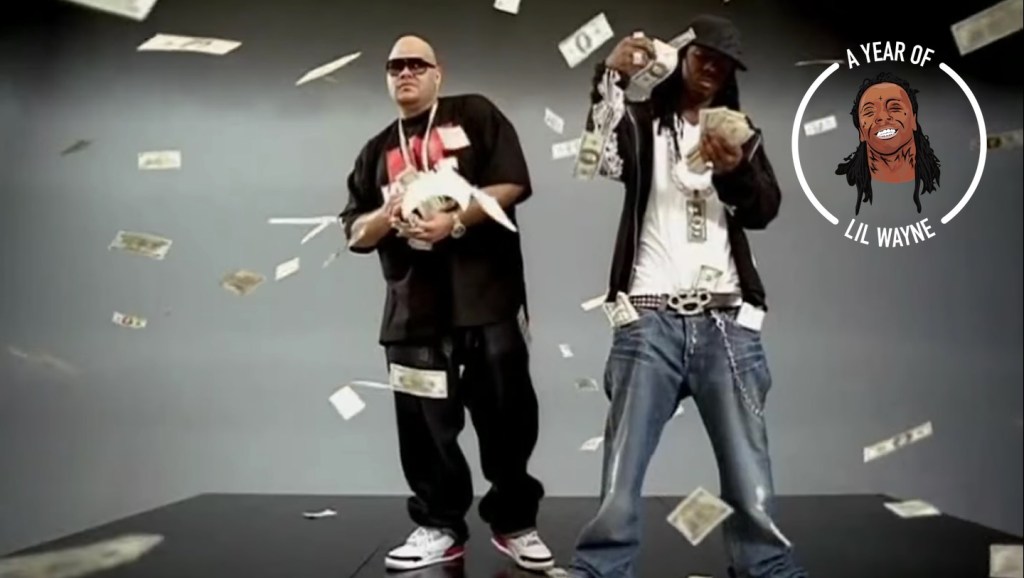Day 294: “Make It Rain” feat. Lil Wayne – Fat Joe, Me, Myself & I, 2006
“Now why’s everybody so mad at the South for?”: Those words rang out like gospel in the fall of 2006, especially over the radio in North Carolina. Fat Joe was spitting the truth, embracing the unstoppable wave of the South, the hottest region in rap, and its hottest artist, Lil Wayne. The song blew up. I remember it playing at every single party my freshman year of college. It was so big that, like “Bling Bling” before it, it literally changed the language of pop culture. Suddenly, everyone knew what this phenomenon of throwing one dollar bills, previously limited to the strip club cognoscenti, was all about: “got a handful of stacks, better grab an umbrella.”
Videos by VICE
By 2011, a New York Times article about the trend would note, “Anyone with a few gigs of hip-hop in their iTunes knows the term, which can have multiple meanings. It has become a staple in strip-club anthems like ‘Make It Rain,’ by Fat Joe, featuring Lil Wayne.” That article noted the practice was divisive among strippers, but by that time it was already fully absorbed in hip-hop’s DNA, no doubt in part from the single. It’s probably an exaggeration but maybe not a big one to say that Migos as they exist now would not be here without the strides made by Terror Squad in 2006 (although we can probably credit Travis Porter’s song of the same name a bit more directly).
But the legacy of the term “make it rain” aside, it’s also true that the song represented a definitive turning point in Wayne’s career, at least as I saw it, which, once again, was very much through the lens of the song playing at every party I went to during what was perhaps the most party-heavy year of my life. Despite the fact that it’s technically Fat Joe’s single—I only just now, listening critically in 2017, registered that Lil Wayne doesn’t actually even rap a verse on it—”Make It Rain” changed things for Lil Wayne. For one thing, it was part of a trifecta of singles that included “Stuntin’ Like My Daddy” and Lloyd’s “You,” which gave Wayne a stranglehold on radio.
The November 4, 2006 issue of Billboard featured an article titled “Wayne’s World,” about the rapper’s growing radio presence, in which Universal Motown VP of marketing Katina Bynum is quoted as saying, “Every time I turn around, I have a new song on my desk. If we cleared all the songs, it’d be Lil Wayne radio.”
Not only was Wayne suddenly as ubiquitous as the dollar bills mentioned in the song in question, he was thrust into a new light. Although it would still be years—if at all—before he was seen as anything other than a poppy Southern gimmick by the most hardcore East Coast rap enthusiasts, it was certainly symbolic for him to score a hit with a credible New York artist like Fat Joe. Sure, he was just the pop-oriented Southern hook, but, like Joe had already seen, that was the direction things were headed: “Change your style up, switch to southpaw,” he encourages in that second verse, adding onto the idea of everyone being mad at the South.
“This comes at at a time when the South was just winning, winning, winning,” he told Complex in 2011. He described going to a club in Memphis where the DJ played nothing but southern rap and watching a girl dance by the speaker all night, and, he said, that was the image that stuck in his mind as he coached Scott Storch on what kind of beat to make. “I got back home, and I said to Scott Storch, ‘Yo Scott, let’s go work on a beat. I want to make a dirty south beat.’ And he’s like, ‘Get outta here. That ain’t Fat Joe.’ But I’m like, ‘My man, watch how we freak this.’” He went on to explain Lil Wayne’s addition to the song:
I originally did the chorus. I played it for Irv Gotti and he was like, ‘You’re cool with Lil Wayne. Get him to do [the chorus]. He’ll do it in a second. That way niggas won’t be so mad at you. It’s already a down south track, so at least it makes more sense to have a down south nigga on it too.’ So I sent it to Lil’ Wayne, he sent it right back the next day, and the rest is history.
We had just left the strip club like two days before, making it rain. And I was like, ‘Nobody ever made a song called ‘Make It Rain.” I thought that was weird. People have been making it rain for years. Why did no one ever make a song about it?
Fat Joe was perceptive, and he caught a wave just as it was cresting. Wayne’s hook not only made the song—it redefined the era. Fat Joe and Wayne, of course, would continue to link up, particularly through their mutual friend DJ Khaled, who can be seen enthusiastically holding an umbrella for Fat Joe in the “Make It Rain” video (look for Diddy, Rick Ross, and Birdman, too—it’s a hell of a video). They both appeared on “We Takin’ Over,” which arguably launched Khaled’s career on the trajectory it’s still on today.
They also popularized a term that has utterly permeated pop culture, from Parks and Rec to Kim Kardashian’s custom emojis. “Make It Rain” was turning point for America, and it was pretty good for Lil Wayne’s career, too. Plus, to this day, this song absolutely bangs in ways that make you want to stand on couches and throw money until there are no more couches to stand on and no more money to throw.
Follow Kyle Kramer on Twitter.
More
From VICE
-

Kendrick Lamar announces his Super Bowl LIX halftime show via YouTube. -

-


